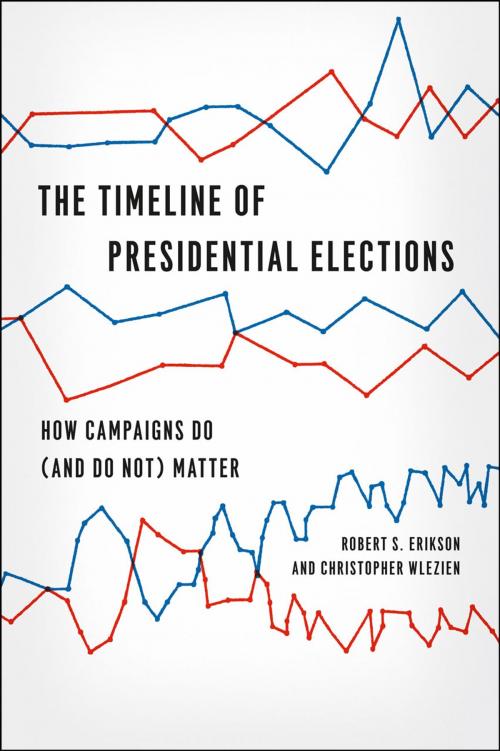The Timeline of Presidential Elections
How Campaigns Do (and Do Not) Matter
Nonfiction, Social & Cultural Studies, Political Science, Government, Elections| Author: | Robert S. Erikson, Christopher Wlezien | ISBN: | 9780226922164 |
| Publisher: | University of Chicago Press | Publication: | August 24, 2012 |
| Imprint: | University of Chicago Press | Language: | English |
| Author: | Robert S. Erikson, Christopher Wlezien |
| ISBN: | 9780226922164 |
| Publisher: | University of Chicago Press |
| Publication: | August 24, 2012 |
| Imprint: | University of Chicago Press |
| Language: | English |
In presidential elections, do voters cast their ballots for the candidates whose platform and positions best match their own? Or is the race for president of the United States come down largely to who runs the most effective campaign? It’s a question those who study elections have been considering for years with no clear resolution. In The Timeline of Presidential Elections, Robert S. Erikson and Christopher Wlezien reveal for the first time how both factors come into play.
Erikson and Wlezien have amassed data from close to two thousand national polls covering every presidential election from 1952 to 2008, allowing them to see how outcomes take shape over the course of an election year. Polls from the beginning of the year, they show, have virtually no predictive power. By mid-April, when the candidates have been identified and matched in pollsters’ trial heats, preferences have come into focus—and predicted the winner in eleven of the fifteen elections. But a similar process of forming favorites takes place in the last six months, during which voters’ intentions change only gradually, with particular events—including presidential debates—rarely resulting in dramatic change.
Ultimately, Erikson and Wlezien show that it is through campaigns that voters are made aware of—or not made aware of—fundamental factors like candidates’ policy positions that determine which ticket will get their votes. In other words, fundamentals matter, but only because of campaigns. Timely and compelling, this book will force us to rethink our assumptions about presidential elections.
In presidential elections, do voters cast their ballots for the candidates whose platform and positions best match their own? Or is the race for president of the United States come down largely to who runs the most effective campaign? It’s a question those who study elections have been considering for years with no clear resolution. In The Timeline of Presidential Elections, Robert S. Erikson and Christopher Wlezien reveal for the first time how both factors come into play.
Erikson and Wlezien have amassed data from close to two thousand national polls covering every presidential election from 1952 to 2008, allowing them to see how outcomes take shape over the course of an election year. Polls from the beginning of the year, they show, have virtually no predictive power. By mid-April, when the candidates have been identified and matched in pollsters’ trial heats, preferences have come into focus—and predicted the winner in eleven of the fifteen elections. But a similar process of forming favorites takes place in the last six months, during which voters’ intentions change only gradually, with particular events—including presidential debates—rarely resulting in dramatic change.
Ultimately, Erikson and Wlezien show that it is through campaigns that voters are made aware of—or not made aware of—fundamental factors like candidates’ policy positions that determine which ticket will get their votes. In other words, fundamentals matter, but only because of campaigns. Timely and compelling, this book will force us to rethink our assumptions about presidential elections.















